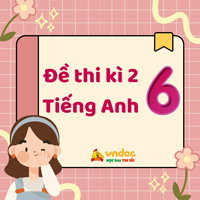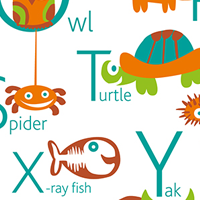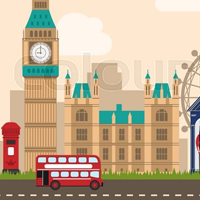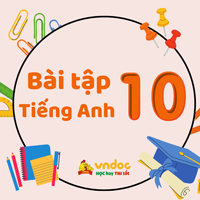Bài tập Tiếng Anh lớp 11 Unit 4: Volunteer Work Số 2 có đáp án
English 11 UNIT 4 TEST 2
Mời thầy cô và các em tham khảo Bài tập Tiếng Anh lớp 11 Unit 4: Volunteer Work Số 1 có đáp án trên VnDoc.com. Bài tập trắc nghiệm Tiếng Anh lớp 11 được biên soạn gồm nhiều dạng bài tập hay giúp các em làm quen dần với các đề thi Tiếng Anh lớp 11. Sau đây mời thầy cô cùng các em vào tham khảo.
Bài tập Tiếng Anh lớp 11 Unit 3 số 2 có đáp án
Bài tập Tiếng Anh lớp 11 Unit 4: Volunteer Work có đáp án
Bài tập Tiếng Anh lớp 11 Unit 4: Volunteer Work Số 1 có đáp án
I. PRONUNCIATION
A. Choose the word that has main stress placed differently from the others.
1. a. voluntary | b. orphanage | c. comfortable | d. advantage |
2. a. overcorne | b. participate | c. volunteer | d. understand |
3. a. museum | b. disaster | c. literacy | d. minority |
4. a. support | b. suffer | c. suggest | d. succeed |
5. a. handicapped | b. campaign | c. performance | d. donation |
II. LANGUAGE FOCUS
A. Choose the one word or phrase- a, b, c, or d- that best completes the sentences.
6. Each nation has many people who voluntarily take care______ others.
a. in b. on c. to d. of
7. They give care and comfort ______ disadvantaged children.
a. for b. to c. on d. at
8. They have no money and are forced to live on ______.
a. fund b. saving c. charity d. donation
9. This scheme could be ______ for people in low incomes.
a. advantage b. advantaged c. advantageous d. disadvantaged
10. Schools need ______ to help children to read and write.
a. volunteers b. pioneers c. engineers d. innovators
11. We would like to see closer ______ between parents and schools.
a. cooperation b. coordination c. coexistence d. coeducation
12. At present we are ______ an anti-drug campaign.
a. setting up b. carrying out c. taking part in d. joining with
13. The work of the charity is funded by voluntary ______.
a. movements b. teenagers c. donations d. campaigns
14. A(n) ______, is a person who is killed because of their political beliefs.
a. invalid b. soldier c. veteran d. martyr
15. His kind words brought some ______ to the grieving parents.
a. sympathy b. comfort c. interest d. gratitude
B. Choose the word or phrase - a, b, c, or d - that best completes the sentence.
16. 'Is Marsha still here?' 'No. She was the first ______.
a. leaving b. that she left c. to leave d. in leaving
17. I've heard a lot about Dr. James, and I'm looking forward ______ his talk tomorrow.
a. hear b. hearing c. to hear d. to hearing
18. 'Did Nancy faint yesterday?' 'Yes, and that led to ______ to the emergency clinic. '
a. her taking b. her to be taken c. her to go d. her being taken
19. He was often made ______ milk by his mother.
a. drink b. drinks c. to drink d. drunk
20. I don't blame you ______ to go outside in this awful weather.
a. not wanting b. for not wanting
c. not to want d. not to have wanted
21. The spy admitted ______ some highly secret information to enemy agents.
a. having given b. having been given
c. to have given d. to have been given
22. They were fortunate ______ from the fire before the building collapsed.
a. rescuing b. to have rescued
c. to rescue d. to have been rescued
23. It is important that the TOEFL Office ______ an applicant's registration.
a. will confirm b. confirm c. confirms d. must confirm
24. It's no good ______ me of getting the figures wrong!
a. to accuse b. accusing c. having accused d. to have accused
25. No sooner ______ the corner than the wheel came off.
a. the van turned b. did the van turned
c. the van had turned d. had the van turned
III. READING
A. Choose the correct word or phrase- a, b, c or d - that best completes the passage.
In the United States, volunteering is (31) ______ as a good way to give children a sense of (32) ______ responsibility and to bring the family together. Volunteerism is (33) ______ across the United States today because people are trying to put more emphasis on family (34) ______, and they are looking for ways to help young people have a feeling of hope and satisfaction. It is (35) ______ that volunteering helps children discover their talents, develop their skills, and learn about (36) ______ and problem solving. (37) ______, family volunteering has some (38) ______ it benefits the community that is (39) ______, it benefits the family for serving together, and it benefits each (40) ______ in the family.
31. a. respected | b. viewed | c. inspected | d, showed |
32. a. commune | b. communal | c. communion | d. community |
33. growing | b. traveling | c. extending | d. forming |
34. a. background | b. relationships | c. togetherness | d. connections |
35. a. regarded | b. believed | c. concerned | d. accepted |
36. a. operation | b. corporation | c. correspondence | d. cooperation |
37. a. Moreover | b. However | c. Therefore | d. Consequently |
38. a. advantages | b. disadvantages | c. conveniences | d. inconveniences |
39. a. cared | b. taken | c. served | d. offered |
40. a. character | b. community | c. personnel | d. individual |
B. Read the text carefully, then choose the correct answers.
A YEAR WITH OVERSEAS VOLUNTEERS
I was with Overseas Volunteers (OV) for a year after leaving university, and I was sent to an isolated village in Chad, about 500 km from the capital N'Djamena. Coming from' a rich country, I got quite a shock as conditions were much harder than I had expected. But after a few days I soon got used to living there. The people were always very friendly and helpful, and soon I began to appreciate how beautiful the countryside was.
One of my jobs was to supply the village with water. The well was a long walk away. And the women used to spend a long time every day carrying heavy pots backwards and forwards. So I contacted organization and arranged to have some pipes delivered. We built a simple pipeline and a pump, and it worked first time. It wasn't perfect - there were a few leaks, but it made a great difference to the villagers, who had never had running water before. And not only did we have running water, but in the evenings it was hot, because the pipe had been lying in the sun all day. All in all, I think . my time with OV was a good experience. Although it was not well-paid, it was well worth doing, and I would recommend it to anyone who was considering working for a charity.
41. The author ______.
a. has been working for OV for a year
b. is living in the capital N'Djamena
c. was born in a rich family
d. used to be a volunteer working in a remote village
42. How did the author feel when he arrived in the village?
a. surprised b. impressed c. disappointed d. depressed
43. Which of the following is not true?
a. It took a lot of time to take water home from the well.
b. The villagers used to live in conditions without running water.
c. A pipeline was built to carry clean water to homes.
d. Solar energy was used to heat water.
44. The word 'It' in line 13 refers to ______.
a. running water b. the pump c. the pineline d. the supply of water
45. What does the author think about his time with OV?
a. It was paid a lot of money. b. It was not worth working.
c. It wasted time. d. It provided good experience.
IV. WRITING
A. Choose the answer - a, b, c, or d -that is nearest in meaning to the printed before it.
46. There was very little response to the charity appeal.
a. Nobody responded to the charity appeal.
b. Very little money was raised by the charity appeal.
c. Everybody seemed to appeal to the charity.
d. They raised a lot of money from the charity 'appeal.
47. With the help of new computer programs, we can solve many problems quickly and accurately.
a. New computer programs have enabled us to solve many problems quickly and accurately.
b. New computer programs are quick and accurate.
c. We can solve problems quickly and accurately without computer programs.
d. New computer programs are not able to solve many problems quickly and accurately.
48. People swimming here do so at their own risk.
a. People may swim here without fear or risk.
b. Swimming is so risky here that it is forbidden.
c. People should realize that it is dangerous to swim here.
d. Swimmers will not be blamed if anything happens to them here.
49. After fighting the fire for 12 hours, the firemen succeeded in putting it out.
a. The fireman managed in vain to put the fire out after a 12-hour fight.
b. Having fought the fire for 12 hours, the firemen were able to put it out.
c. The firemen wasted 12 hours putting the fire out.
d. Fighting the fire for 12 hours, the fire was put out.
50. People donated a lot, so the victims of the tsunami are now able to overcome difficulties.
a. But for people's generous donation, the victims of the tsunami wouldn't be able to overcome difficulties now.
b. Despite people's generous donation, the victims of the tsunami are facing lots of difficulties now.
c. To overcome difficulties, the victims of the tsunami needed people's generous donation.
d. The victims of the tsunami are now able to overcome difficulties but for people's generous donation.
B. Choose the best sentence- a, b, c, or d- made from the given cues.
51. I/ strong/ advise/ you/ take part/ volunteer works//
a. I am strong advise that you should take part in volunteer works.
b. I strongly advise that you might take part for volunteer works.
c. I strongly advise that you should take part in volunteer works.
d. I am strong in advising you to take part in volunteer works.
52. Only when/ general's personal diaries/ publish/ truth/ come out//
a. Only when the general's personal diaries were published did the truth come out.
b. Only when the general's personal diaries had been published the truth come out.
c. Only when the general's personal diaries were published had the truth come out.
d. Only when the general's personal diaries were published the truth came out.
53. Since/ beginning/ course/ I/ never/ be late/ class//
a. Since the beginning of the course I had never . been late for class.
b. Since the beginning of the course I never have been late for class.
c. Since the beginning of the course I have never been late for class.
d. Since beginning the course I had never been late for class.
54. Be/ doctor/ she/ know/ what/ side-effects/ medicine/ have//
a. Be a doctor, she knows what side-effects the medicine can have.
b. Being a doctor, she knew what side-effects the medicine could have.
c. Having been a doctor, she had known what side-effects the medicine could have.
d. To be a doctor, she knows what side-effects the medicine might have.
55. young people/ fed/ queue/ unemployment benefit//
a. The young people fed with queuing for their unemployment benefit.
b. The young are fed with queuing for their unemployment benefit.
c. Young people have fed up with queuing for their unemployment benefit.
d. Young people are fed up with queuing for their unemployment benefit.














